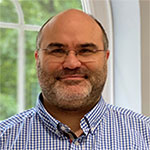Mar
14

Date: 14 March 2023
Time: 3:00 PM CET (Local time)
Presenter(s): Prof. Alejandro Frangi
Biography
 Alejandro Frangi is a Turing Fellow of the Alan Turing Institute, is the Scientific Director of the Leeds Centre for
Alejandro Frangi is a Turing Fellow of the Alan Turing Institute, is the Scientific Director of the Leeds Centre for
HealthTech Innovation, and Director of Research and Innovation of the Leeds Institute for Data Analytics. He
holds an Honorary Chair at KU Leuven in the Departments of Electrical Engineering (ESAT) and
Cardiovascular Science.
Abstract
In this talk, I will overview our progress in the INSILEX Programme. We envision a paradigm shift in medical device innovation, where quantitative sciences are exploited to carefully engineer medical device designs, explicitly optimize clinical outcomes, and thoroughly test side effects before being marketed. In-silico clinical trials (ISCT) are essentially computer-based medical device trials performed on populations of virtual patients. They use computer models/simulations to conceive, develop, and assess devices with the intended clinical outcome explicitly optimized from the outset (a-priori) instead of tested on humans (a-posteriori). This will include testing for potential risks to patients (side effects), exhaustively exploring in-silico for medical device failure modes and operational uncertainties before being tested in human clinical trials. Advanced computer modelling will prove useful to predict how a device behaves when deployed across the general population or when used in new scenarios outreaching the primary prescriptions (device repurposing), helping to help the widest possible target patient group without unintended consequences of side effects and device interactions.
INSILEX is underpinned by Computational Medicine, an emerging discipline devoted to developing quantitative approaches for understanding the mechanisms, diagnoses, and treatment of human disease through the systematic application of mathematics, engineering, and computational science. Dealing with the extraordinary multi-scale
complexity and variability intrinsic to human biological systems and health data demands radically new approaches compared to methods for manufactured systems.
Within this framework, INSILEX extensively uses medical image computing, a mature field challenged by the progress made across all medical imaging technologies and more recent break-throughs in biological imaging. The cross-fertilization between medical image analysis, medical imaging physics and technology, and domain knowledge from medicine and biology has spurred a truly interdisciplinary effort that stretched outside the original boundaries of the disciplines that gave birth to this field and created stimulating and enriching synergies. This talk summarizes and formalizes our vision of Precision Imaging for Precision Medicine and highlights connections with past research and our current focus on large-scale computational phenomics and in-silico clinical trials.
